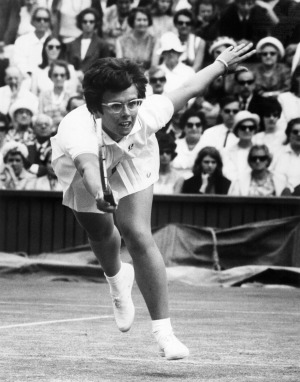 As if to keep the enthusiasm for tennis up after the close of another U.S. Open, here’s a timely “American Masters” (PBS, 8 p.m., check local listings) on one of the masters of the sport and, according to some of the interview subjects in the exhaustive biography, one of the greatest pioneers in sports period.
As if to keep the enthusiasm for tennis up after the close of another U.S. Open, here’s a timely “American Masters” (PBS, 8 p.m., check local listings) on one of the masters of the sport and, according to some of the interview subjects in the exhaustive biography, one of the greatest pioneers in sports period.
Billie Jean King’s love for tennis came young, when no other sport was available to her. She tried her all to be the best at it and she pretty much was, winning 39 Grand Slam titles. She was beloved the first time she did it, in part because she was such a chatterbox, as King herself explains in the film. But then they turned on her, maybe because she was still a chatterbox.
King’s voice wouldn’t go silenced, though, when she learned that male tennis players made much more than women, who weren’t paid at all at first. Her activism in that field coincided with women’s liberation struggles in the late 60s and the establishment of Title IX in 1972, guaranteeing equal treatment for women’s sports in school.
That is why when she agreed to take part in the spectacle of playing Bobby Riggs in a Battle of the Sexes round, it meant so much — for the future of taking women seriously in sport, for young people counting on Title IX and for women’s struggles in general.
It’s instructive to see, for example, how invested Hilary Clinton was at the struggles of the woman of her generation as she likely weighs her own advancement.
For as much as she accomplished on the tennis court, King’s life will be forever defined by that one highly-publicized match with Riggs, in which it seemed gender itself was in the balance.
Hence, the majority of James Erskine’s film has to do with the match as well. But because King is, well, a chatterbox, we learn an awful lot about her family, her marriage, her changing sexual preference and life since The Match.
The film marks both the 40th anniversary of that match against Riggs, held on Sept. 20, 1974, and the 20th anniversary of the founding of the Women’s Tennis Association this year, preceded by King’s own Virginia Slims series.
At a chatty session at the TV Critics Association summer press tour last month in Beverly Hills, King tried to set the stage for what she faced in those days.
“You have to remember,” she said, “when I played Bobby Riggs, we were on the third year of women’s professional tennis. It was such a tenuous position. We were
labeled, all the time, ‘women libbers.’ It was so difficult.
“We were just always under the gun from the media. I mean, you have to remember,
when I played Bobby Riggs, there wasn’t one woman — not one woman sports reporter. Not one.”
Though it might have seemed to some they were doing the exhibition match for fun, King says “It was not fun. Also I knew the implications. I knew what it stood for. I knew what the it was very symbolic of the women’s movement and what we were trying to do. Title IX had just been passed the year before: June 23, 1972. So I wanted to start to change the hearts and minds of people to match up the legislation of Title IX, and I knew there were a lot of people who wanted to weaken that piece of legislation, and I was scared. I did not want that to happen.
“And in those days, I knew it took three generations to change people’s hearts and minds. Now, if you’re in a village with the phones in Afghanistan, you can do it in two and a half years, but back in 1973, I mean, a woman could not even get a credit card without her husband’s signing, cosigning.”
She knew she was a part of history. “It was about equality. That was about change. History is about change. That’s why I tell young people, ‘The more you know about history, the more you know about yourself.’
“You knew this was a moment where you could either go forward,” she said, or not.
“Every generation gets so much better,” King says. “If I were born today, maybe, but no. And I’d have to probably be six inches taller. I mean, Sharapova is 6′ 2 1/2”; Venus 6 ‘ 2 1/2″; Serena’s short at 5’ 11″ or 10.” That’s short nowadays. It’s unbelievable.”